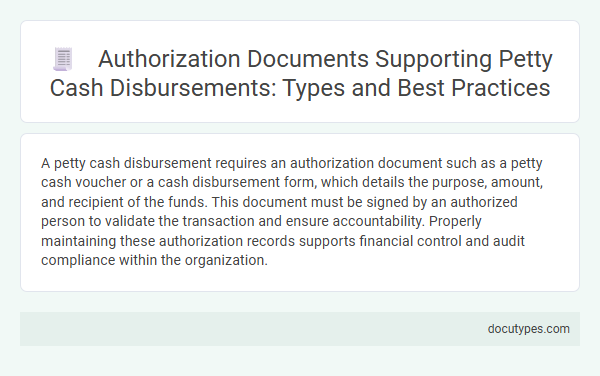A petty cash disbursement requires an authorization document such as a petty cash voucher or a cash disbursement form, which details the purpose, amount, and recipient of the funds. This document must be signed by an authorized person to validate the transaction and ensure accountability. Properly maintaining these authorization records supports financial control and audit compliance within the organization.
Introduction to Authorization Documents for Petty Cash
Authorization documents are essential for managing petty cash disbursements, ensuring proper control and accountability. These documents provide formal approval for the release of funds from the petty cash reserve.
The most common type of authorization document supporting petty cash disbursements is a petty cash voucher or request form. This document typically includes details such as the amount requested, purpose of the expense, date, and approval signature to validate the transaction.
Importance of Proper Authorization in Petty Cash Management
| Authorization Document Type | Role in Petty Cash Disbursements | Importance in Petty Cash Management |
|---|---|---|
| Petty Cash Voucher | Serves as the primary document authorizing disbursement of petty cash funds. It details the amount, purpose, and recipient of the cash given. | Ensures accountability by providing a paper trail for every transaction, reducing the risk of misuse or misappropriation of funds. |
| Authorization Signatures | Signatures from designated authorized personnel confirm approval for the disbursement, validating the legitimacy of the expense. | Prevents unauthorized withdrawals and maintains control over petty cash usage. |
| Receipt or Expense Documentation | Supports the voucher by documenting actual expenses incurred from petty cash disbursements. | Promotes transparency and facilitates audits or reconciliations by verifying how funds were spent. |
| Petty Cash Log or Register | Records each disbursement along with authorization details in a continuous ledger format. | Helps in monitoring cash balances and prevents over-expenditure by maintaining accurate records. |
Common Types of Authorization Documents
Petty cash disbursements require proper authorization to ensure financial control and accountability. Common types of authorization documents include petty cash vouchers, reimbursement forms, and authorization slips, each providing evidence of approval for cash release. You should always maintain these documents as part of your financial records to support audit trails and prevent misuse.
Approval Forms for Petty Cash Disbursements
Approval forms for petty cash disbursements serve as the primary authorization document to ensure proper control and accountability. These forms require specific details such as the amount requested, purpose of the expense, and authorized signatures before funds are released. You must retain these approval forms as part of your financial records to support auditing and prevent misuse.
Receipts and Supporting Invoices
Petty cash disbursements require proper authorization documents to ensure accountability and accurate financial tracking. Receipts and supporting invoices serve as essential evidence validating each transaction.
- Receipts as Authorization - Receipts provide a detailed record of purchases, confirming the expenditure occurred for legitimate business purposes.
- Supporting Invoices - Invoices offer itemized proof of goods or services acquired, linking petty cash usage to specific vendors.
- Compliance and Audit Trail - Together, receipts and invoices create a verifiable audit trail that supports internal controls and financial compliance.
Reimbursement Vouchers: Structure and Requirements
What type of authorization document supports petty cash disbursements? Reimbursement vouchers serve as the primary authorization document for petty cash disbursements. These vouchers include structured details such as the date, amount, purpose of the expense, and approval signatures to ensure proper documentation and accountability.
Signatory Authority and Delegation
Authorization documents supporting petty cash disbursements establish signatory authority and the delegation of financial responsibilities. These documents ensure that only designated individuals can approve and manage petty cash expenses.
- Signatory Authority Document - Defines the individuals authorized to approve petty cash disbursements within an organization.
- Delegation of Authority Letter - Formally assigns petty cash management responsibilities from higher management to specific employees.
- Petty Cash Policy - Details controls and procedures, specifying who can access and disburse petty cash funds.
Digital vs. Paper-Based Authorization Documents
Authorization documents supporting petty cash disbursements include both digital and paper-based formats. Digital authorization documents offer increased security, easy tracking, and faster approval processes compared to traditional paper-based methods.
Paper-based authorization documents remain common for petty cash due to simplicity and widespread acceptance in organizations without advanced digital infrastructure. Choosing the appropriate type depends on the organization's workflow, security requirements, and record-keeping standards.
Best Practices for Documenting Petty Cash Transactions
The authorization document that supports petty cash disbursements is typically a petty cash voucher or petty cash receipt. This document serves as proof of approval and ensures that transactions are properly recorded for accountability.
Best practices for documenting petty cash transactions include using pre-numbered vouchers to prevent errors and fraud. Every petty cash disbursement should be approved by an authorized person and supported by original receipts or invoices. Maintaining a detailed petty cash log helps you track expenses and reconcile the petty cash fund regularly.
What Type of Authorization Document Supports Petty Cash Disbursements? Infographic

